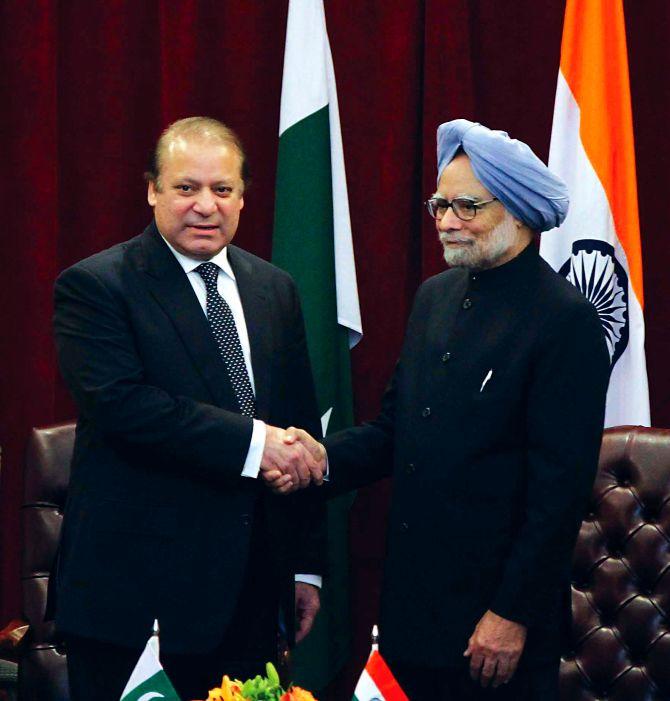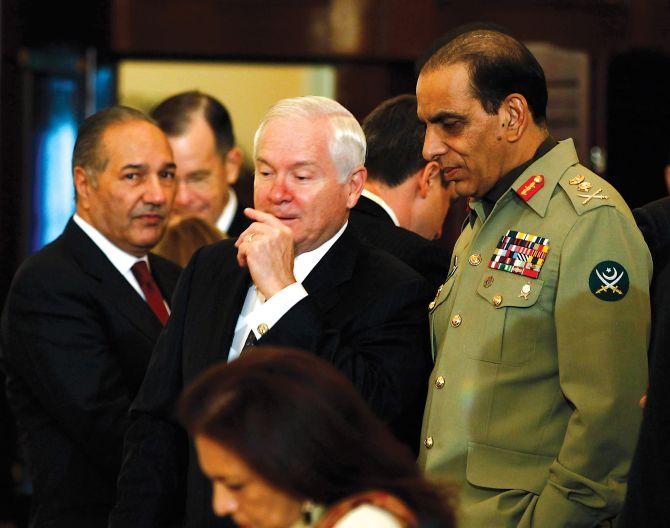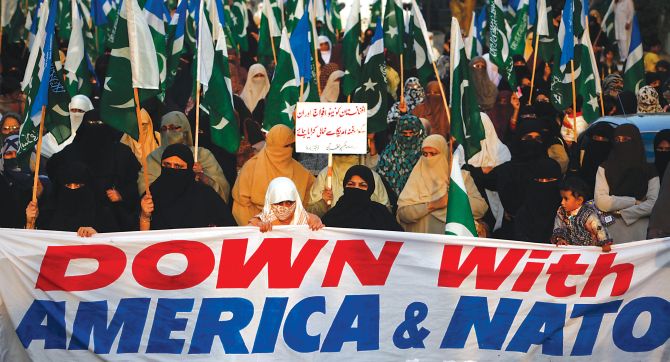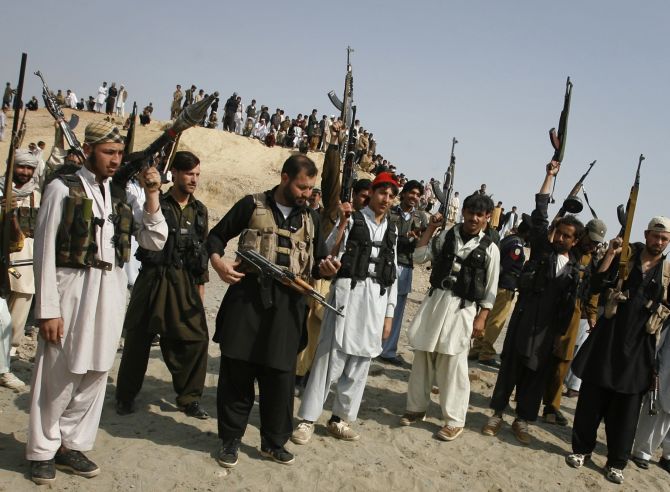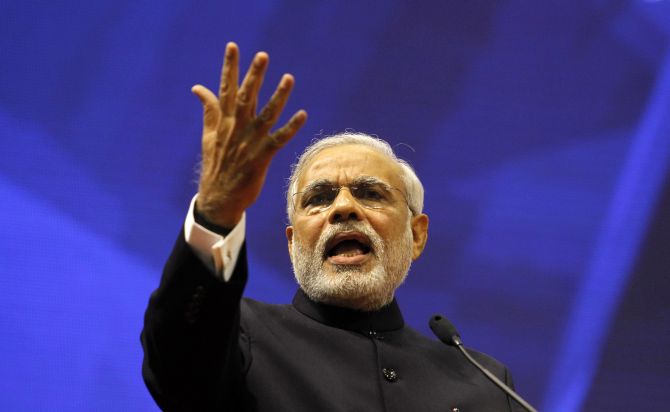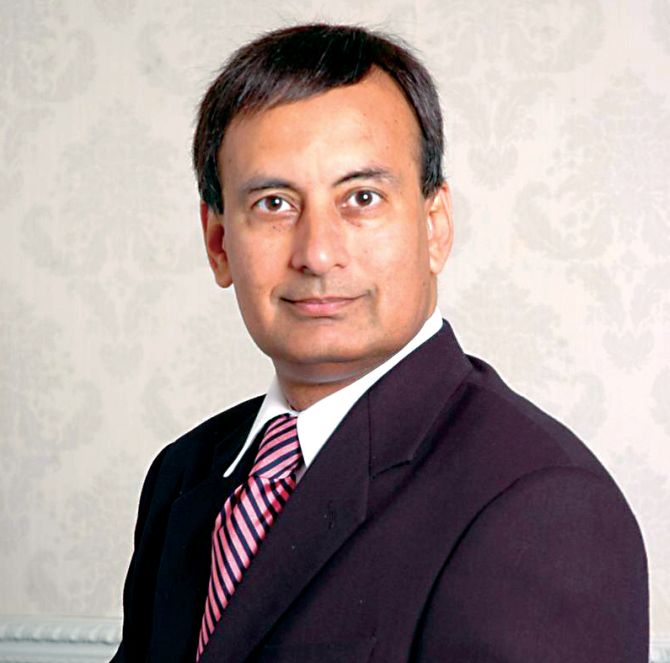 | « Back to article | Print this article |
'Sharif will have to work hard to convince anti-India hardliners'
'Good relations between India and Pakistan will be to the benefit of both countries. Unfortunately, there are serious impediments to that, not the least of which is the entire jihadi mindset in Pakistan.'
'A hardline view about Pakistan among some quarters in India does not help the prospect of positive relations between India and Pakistan.'
![]()
Husain Haqqani, former Pakistani ambassador to the United States, presents an insider's insights into the US-Pakistan and the India-Pakistan relationships in this conversation with Rediff.com's Aziz Haniffa.
Former US secretary of state Madeleine Albright calls Husain Haqqani's Magnificent Delusions: Pakistan, the United States, and an Epic History of Misunderstanding, a 'fascinating insider's account of America's important but troubled relationship with Pakistan.'
Noting that the former Pakistani ambassador (2008 to 2011) to the United States's purpose is not to fix blame, but to explain how two countries that have for 60 years described themselves as allies can nevertheless misunderstand each other thoroughly and repeatedly, Albright believes the book will give 'future diplomats much to contemplate.'
Walter Isaacson, chief executive officer, Aspen Institute, and author of Steve Jobs and Kissinger: A Biography, says, 'This is a must-read book for anyone who seeks to understand geopolitics in the 21st century... His (Haqqani's) personal insights and objective analysis can help dispel the misunderstandings that are so dangerous.'
The book delves extensively through historic accounts, including hitherto unpublished material; Pakistan-US relations in context of Islamabad's hostility with India; Pakistan's role in global jihad through proxy groups like the Lashkar-e-Tayiba, responsible for the 26/11 terror attackd in Mumbai -- all seen through the lens of Haqqani's first-hand knowledge.
Haqqani -- who was ousted after Memogate: a controversy regarding a memo that sought US help in averting a military takeover in Islamabad after the Osama bin Laden raid, which was outed in a newspaper article by the man who apparently delivered the memo -- explains why Pakistan and the US may be on a collision course.
What provoked you to write this book?
This book has been in the making for years. I always thought there were two or three areas that needed to be written about -- first was the relationship between the Islamists and the Pakistani military establishment. I wrote that book a few years ago.
I had a second book in my mind always about the US-Pakistan relationship, and a third book I want to write is how Pakistan can be built on a more solid foundation than it has been built; that is going to be my third book.
So, the idea for this book was in my head even before I became ambassador. But once I served as ambassador, I learnt many things and saw many things that clarified my own thinking process. After I ceased to be ambassador, I actually did a lot of research in archival material to put together this book. So, nothing provoked me into writing this book. I would say it is a continuity of my thought process.
I believe Pakistan needs to get three things right.
Number one, an understanding of its internal power dynamic, especially why Islamist parties with much less of the vote exercise so much of influence. I've written that in my first book.
Second, US-Pakistan relations -- why is it that Pakistan feels that the United States should be its patron even when it does not wish to be its client and that question I've addressed in this book.
The third will be about Pakistan itself -- as to how Pakistan can come out of its self-created problems and become an effective successful nation State.
Kindly click NEXT to read further...
'I doubt if Pakistan and the US would have had the alliance that they have, if India-US relations would have been different'
Some may perceive your book not only as an indictment of the US-Pakistan relationship, but also as an indictment of Pakistan as a whole.
It is clear that the thrust of your thesis is a stinging and angry critique of the Pakistani military and the Inter-Services Intelligence exercising immense power and clout, notwithstanding the short intermittent spells of civilian, democratic governance?
It is an indictment of neither. It is a description of both.
Americans did not know South Asia at all at the end of the Second World War. They found themselves as one of the world's two superpowers, and they wanted to have a global strategy in which South Asia was also included. So, they had many people dealing with the region who had no historic knowledge of the region.
That is how the US-Pakistan relationship started.
I doubt if Pakistan and the US would have had the alliance that they have, if India-US relations would have been different.
In much of my research, I found that a lot of Americans felt traumatised by what they saw as anti-Americanism of people like (V K) Krishna Menon (a statesman who Time magazine described as the second most powerful man in India after Jawaharlal Nehru) and that drove them more and more toward seeking Pakistan as an ally.
They thought that if we can't have India, we should have Pakistan and then some people thought if we have Pakistan, it will force India to be our ally.
It was a total inability to understand the different motives of India and Pakistan.
What is with the title? Was it wholly yours?
The title was exclusively mine. I wanted the word 'delusions' in the title and then Shuja Nawaz of the Atlantic Council referred me to a book by Charles Dickens, which he had written after visiting the US.
In that book, Dickens had referred to Washington, DC as a city of magnificent intentions based on the grand designs of Pierre L'Enfant, the architect who founded Washington, DC.
From there, I thought, 'Aah, I should transform those magnificent intentions to magnificent delusions,' and that became the title, because after all, the delusions, there was no doubt about, and the magnificent is something I bring out clearly in my book.
Kindly click NEXT to read further...
'US-Pak ties based on exaggerated expectations on both sides'
You seem to be arguing the entire US-Pakistan relationship has been a total deception -- a total farce?
It hasn't been a total deception or a total farce, but it has certainly been based on exaggerated expectations on both sides and it has certainly not fulfilled its objective of bringing some semblance of stability to the South Asian region.
The delusion on Pakistan's part was that by becoming America's ally, Pakistan will be able to gain military parity with India. That goal has not been achieved.
The delusion on America's part was that by giving Pakistan aid and assistance, America will gain sufficient influence in Pakistan to be able to make Pakistan change its strategic calculus -- that purpose has not been achieved either.
Instead, Pakistan's dysfunction has been increased. Pakistan, instead of seeking closer ties with neighbours, has continued to pursue closer ties with the United States.
And the constant influx of military equipment has not allowed a serious debate within Pakistan about the extent to which Pakistan can maintain military parity with India.
American backing for the jihad against the Soviets encouraged Pakistan's own assumptions about being able to carry similar policies forward and in those senses this relationship has disappointed everyone.
But there have been American leaders who genuinely cared about Pakistan and there have been Pakistan leaders who realised that the United States was important for Pakistan's development and security.
Cynics, critics, etc, could argue that this is all a case of Monday morning quarterbacking, and isn't this historical scenario that you paint what realpolitik is all about -- no permanent enemies or permanent friends, only permanent interests -- and that both sides in a sense were always looking for how they can further their permanent interests?
The purpose of history is always to review whether what you defined as your interest was ever fulfilled. My view is that both sides were not able to fulfill their interests that they defined for themselves.
If anything, Pakistan has failed to have an honest debate about what is its national interest. Voices within Pakistan that say that Pakistan's policy should be different on key issues such as Afghanistan or even India, have always been drowned out.
Pakistan has lost more than half its population and half its territory in the loss of East Pakistan, which became Bangladesh.
So, in one sense, the real critique of this relationship should be that it did not fulfill the interests it was supposed to fulfill for both sides.
The second point I'd like to make is that in Pakistan's case, Pakistan's leaders have made a serious mistake in describing India as an existential threat and a permanent enemy.
If there are no permanent friends or permanent enemies in international relations, then neither Afghanistan nor India should be Pakistan's permanent enemies either.
I believe that in the case of the US-Pakistan relationship, the Americans built up unrealistic expectations on the part of Pakistan, which were shattered by reality.
Pakistan over-promised to the Americans and their inability to fulfill their promises also adversely affected the relationship.
Kindly click NEXT to read further...
'The entire jihadi machinery in Pak was created on the basis of the fear of India as an existential threat'
You write extensively about Pakistan's paranoia vis-a-vis India and the unnatural sense, as you describe it, of India being perceived as an existential threat. Why do you devote so much ink to this particular obsession of Pakistan?
First of all, for those who feel it, it is not paranoia -- it is a genuine concern. This is the concern that has shaped Pakistan's worldview.
Successive Pakistani leaders have explained Pakistan's excessive investment in its military on grounds that there is an existential threat from India.
The entire jihadi machinery was created on the basis of the fear of India as an existential threat. I believe it is a very important element in understanding Pakistan and in dealing with Pakistan.
The Americans often did not historically push back the Pakistanis by sharing their own intelligence and saying, 'You know, what you are telling us about India wanting to finish you off is not what we find from our intelligence,' and that only accentuated the Pakistani claim that Pakistan needed American weapons to protect itself against an existential threat.
So, because of that context, it was important to analyse this perceived fear as well as both Pakistani and American reactions to it.
Isn' it also a case of being a very finely defined strategic ploy by the Pakistani military and ISI to sustain themselves, particularly when things are bad domestically?
A lot of people think that the view of India as an existential threat has been created only by Pakistan's military establishment. I feel that it is a little more than that.
I feel that the campaign to create Pakistan created a psyche that outlasted the creation of the country and has now become far deeply rooted within Pakistan.
The military does benefit from it in terms of getting a bigger share of resources, but the military is not the only driver of this psyche.
The permeating theme of your book seems to indicate a very pessimistic outlook about US-Pakistan ties, and the implied prediction is a downward spiral once the US and NATO troops are withdrawn from Afghanistan in 2014?
Actually, I am not pessimistic, but I do not wish to come across as unrealistically optimistic. I have just laid out how the relationship has evolved, what ails it and why there are so many distorted narratives about it on both sides.
Kindly click NEXT to read further...
'India cannot be in anger mode towards anybody, including Pakistan'
Pakistan Prime Minister Nawaz Sharif when he was in Washington for his summit with President Barack Obama spoke of seeking a rapprochement with India is his favourite subject. What is your prognosis for India-Pakistan relations down the road?
Good relations between India and Pakistan will be to the benefit of both countries. Unfortunately, there are serious impediments to that, not the least of which is the entire jihadi mindset in Pakistan.
A hardline view about Pakistan among some quarters in India also does not help the prospect of positive relations between India and Pakistan.
I am glad that Prime Minister Nawaz Sharif recognises the importance of normal relations between the two neighbours. He has a lot of hard work to do in convincing the hardliners within Pakistan.
He also has to bring under control the various armed militant groups that have declared their intention to continuously wage war against India.
If an organised element within the country continues to want to wage war against India, the effort to normalise relations by Prime Minister Sharif will definitely run into difficulties.
In this context, what would you say to the advent of someone like Narendra Modi as India's next PM? What would it do to the relations between Delhi and Islamabad?
Once leaders are elected, their political rhetoric is often replaced by pragmatism and if India has to continue the momentum of its previous economic success, it cannot be in anger mode towards anybody, including Pakistan.
Kindly click NEXT to read further...
'I'm a Pakistani who just wants Pakistan to change positively'
At your book launch, you spoke of how the book had hardly been out a couple of weeks and that you';ve already been called everything from a blasphemer to a US agent to a traitor.
Are you persona non grata in Pakistan now?
Are you a marked man in terms of the military, the ISI, not to mention jihadi groups? Some may say you were lucky to get out of Pakistan when you did in early 2012 without being killed...
I hear all kinds of things about myself, but right now, I don't let those things bother me. I am very comfortable in my skin about being a Pakistani who just wants Pakistan to change positively.
I realise there may be a physical threat to me in Pakistan if I return... which is why I have chosen to continue to work as an academic and a scholar in the US.
But my efforts still remain directed at reforming Pakistan and not just getting intimidated by those who abuse me or target me.
Can you reconcile with the likes of Nawaz Sharif and his government who perhaps could continue to contend that you were one of the Asif Ali Zardari (former Pakistan president) cronies and they don't have the lock on cronyism and nepotism and corruption?
I believe that Pakistan's politics is evolving and the old paradigm or the old method of going after your political opponents or critics is not going to survive forever.
Like President Zardari, I also offer only good wishes to Prime Minister Sharif. I do not expect them to have the attitude towards me that the Musharraf dictatorship had or those who wanted to persecute me for my independent opinions would like to have.
What do you want to be your book's main takeaway?
The main takeaway from my book is that the relations between nations must be based on a realistic assessment of each other's interests, not on fantasies.
Pakistan and the US also need to base their relations on shared interests.
Unfortunately, both sides have assumed interests on the part of the other that did not exist.
As long as Pakistanis consider India to be their main enemy, America does not have a shared enemy with Pakistan because America is not India's enemy.
Similarly, Pakistan must review its own policies and its own interests and have an internal debate on what are Pakistan's national interests.
Pakistan benefited from good relations with America, but its expectations were not fulfilled, which made Pakistanis bitter about the US.
I want Pakistanis also to read my book and realise where we may have made mistakes in our dealings with the Americans.
